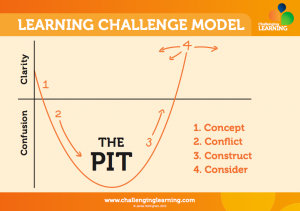The Power of Questions
- On 20-01-2016
Good questions drive learning and thinking. They arise from the outcomes of learning we are intending for our students and they form part of a dialogue we have with students to prod and probe student thinking. They give our classrooms its feel and energy and, as such, questions are culture builders. Good questions are only half of the equation, we must listen deeply as well so that we can put forth questions that push students to elaborate and clarify their thinking.
Using Questions to Achieve Thinking Goals
Ron Ritchhart, in his article The Real Power of Questions, identified how teachers could use questions in different contexts to achieve four specific goals around thinking:
- To model intellectual engagement with ideas
- To promote and nurture ongoing inquiry
- To support students in constructing understanding
- To help students clarify their own thinking to themselves and others
Ritchhart unpacks each of these with case studies (the article is well worth reading) and then ends by suggesting that our questions are an “outward manifestation” of our context about learning, its purposes, and its processes.
But what makes a good question and what is a good approach to creating an environment that accomplishes these four goals?
Research Findings on What Works
Kathleen Cotton in Classroom Questioning summarized the research into classroom questioning and found the following:
General Findings
Instruction which includes posing questions during lessons is more effective in producing achievement gains than instruction carried out without questioning students.
Oral questions posed during classroom sessions are more effective in fostering learning than are written questions.
Asking questions frequently during class discussions is positively related to learning facts.
Increasing the frequency of classroom questions does not enhance the learning of more complex material.
Cognitive Level of Questioning
On the average, during classroom interactions approximately 60 percent of the questions asked are lower cognitive questions, 20 percent are higher cognitive questions, and 20 percent are procedural. Therefore, only 20 percent of the questions we ask students involve intellectual engagement with learning, inquiry, or developing understanding
Lower cognitive questions are more effective when the teacher’s purpose is to impart factual knowledge and assist students in committing this knowledge to memory
In most classes, a combination of higher and lower cognitive questions is superior to exclusive use of one or the other
Simply asking higher cognitive questions does not necessarily lead students to produce higher cognitive responses.
Increasing the use of higher cognitive questions (to considerably above the 20 percent incidence noted in most classes) produces superior learning gains for students
Teaching students to draw inferences and giving them practice in doing so result in higher cognitive responses and greater learning gains.
Wait Time
- The average wait time teachers allow after posing a question or hearing a student’s answer is one second or less. If teachers can extend their wait times to 3 or more seconds then there are improvements in student achievement, retention, length of responses, and higher cognitive responses (amongst other outcomes)
Questioning Strategies
To accomplish the goals of questioning we need to be clear about and articulate the learning goals we are trying to achieve with students, we need to be aware of the frequency we ask questions (and the students ask each other), and we need to provide a framework for the questions students ask.
Below you will find links to a range of resources you could explore to develop your capacity to create a culture of questioning. If you are interested in accessing the full set of material please just ask!
A Typology of Classrooms Questions
Blooms Taxonomy Question Stems
Teaching Students to Ask Their Own Questions
Austin’s Butterfly – a beautiful example of how we can develop student capacity to deliver excellence through questioning within a framework

0 Comments